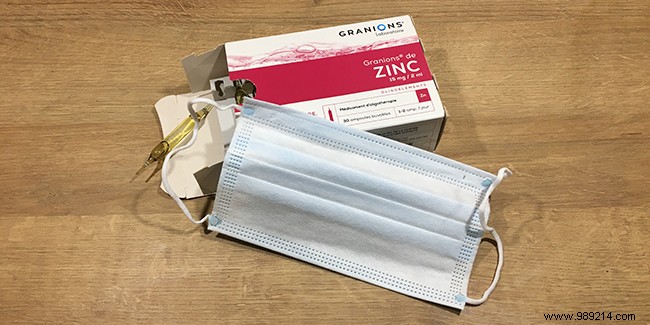
Perhaps you noticed it when you went to your pharmacist:some medicines containing zinc are missing from the shelves following a stock shortage from the manufacturers. They had probably not anticipated the sudden interest, this winter, for zinc for the purpose of prevention, since it plays a role in immunity; it could thus perhaps contribute to the fight against the development of Covid-19. Should we therefore take zinc as a preventive treatment in addition to vitamin D against Covid-19?
Zinc is an essential and important trace element for the proper functioning of the human body, which assimilates it well. It is best known for its anti-inflammatory, antioxidant and immune system strengthening properties to avoid contracting diseases but also to better resist a declared disease.
It plays on growth, it intervenes in many enzymatic processes, it induces biochemical reactions and controls concerning pulmonary surfaces, it acts in cell replication, DNA synthesis, hormonal regulation, blood coagulation. Zinc also influences sperm production and is often indicated in dermatology to treat acne, hair and nail problems.
The body contains between 2 and 4 g, depending on the dietary intake of each individual:the needs of an adult man are normally 12mg per day, and 10mg for an adult woman.
The elderly, whose immune system weakens over the years, often report a zinc deficiency, which can be caused by an insufficient or unbalanced diet, certain pathologies of the digestive system, taking certain drugs that affect the body's nutrient reserves, etc.
Anosmia (loss of smell) and ageusia (loss of taste) can alert on a zinc deficiency, but also the increase in the frequency of intestinal and pulmonary infections, particularly in the elderly.
In 2016, researchers from the American University of Tufts (Boston) conducted a study concluding that zinc would be able to boost the weakened immune system of the elderly.
A diet favoring products rich in zinc is interesting for seniors, knowing that the absorption of the trace element is only partial (15 to 50%) but will be proportionally stronger when it comes to foods of origin. animal compared to those of vegetable origin. The major sources of zinc in the diet, in descending order, are in particular:
Vegetarians and vegans must be careful not to be deficient in zinc since products of plant origin are less efficient in terms of intake. Certain pathologies such as alcoholism, diabetes, kidney disease, Crohn's disease, hepatitis C, HIV, often generate a zinc deficiency. Also, to avoid deficiencies, the doctor tends to prescribe zinc, not necessarily after a blood test because the level is very dependent on the diet and can therefore vary greatly, making the zincemia unreliable.
Zinc is offered in the form of salts, capsules, oral solution, ampoules, food supplements, etc. with varying zinc contents.
It can be purchased without a medical prescription, but it is always best to seek the advice of your doctor or seek the advice of your pharmacist to avoid allergies, contraindications, in particular if you are taking a treatment, if you are pregnant or during lactation. In addition, an overdose of zinc can cause undesirable effects such as digestive disorders, fevers...
The French Society of Pharmacology and Therapeutics (SFPT) issued, on November 23, 2020, a consensus expert response concluding:"In the current state of knowledge, zinc is not effective in preventing or treating COVID-19, neither alone nor combined with hydroxychloroquine or azithromycin ."
However, in the case of seniors who are generally deficient, zinc supplementation can strengthen the immune defenses to help them in the fight against viral infections, the replication of influenza and coronavirus viruses. But to date, to establish a correlation between zinc and covid-19, reliable scientific studies are lacking.